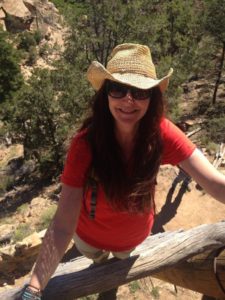
As a child I was always interested in anything of historical value and people who lived in different places and times. This fascination carried on through college where I earned a B.A. in Anthropology at the University of Florida. I did the coursework for my Master’s at Ball State University in Cultural Anthropology, specializing in Native American Studies. From there, I did several cultural surveys, including the SW Native Americans, NW Native Americans, and Jamaica. One field survey was done at Crow Canyon in 1990. That was when I knew I would one day return to this awesome state!
I began teaching Anthropology in 1994 at two of the local community colleges in Denver. Several years later I earned a TESOL certificate and taught ESL as well. After that, I took a “break” to have two daughters, one hamster, one dog, and three cats. I more recently graduated from Post University with a M.Ed. in Instructional Design and Technology. I currently work for CCCOnline where I teach every subfield but linguistics, and often help revise courses.
I also serve as the PAAC coordinator of the Indian Peaks chapter of CAS. I enjoy taking classes here to refresh my skills and knowledge, and I love having the opportunity to participate in field trips, surveys, and attend lectures. I recently went on the Mesa Verde trip this past September, and also did some short field trips before and after this past year’s annual conference.
That being said, I love Anthropology and anything remotely related to history. The many facets and qualities that make up all people have always fascinated me, as well as how they, as a group, have adapted their lives to their unique environments. I love teaching any field of Anthropology partly because, to many it is mostly new material and I think it’s exciting to watch students’ minds and attitudes grow and flourish. I really love teaching it because I feel that having the knowledge and understanding of our past can help us better appreciate the importance of our present and our future.